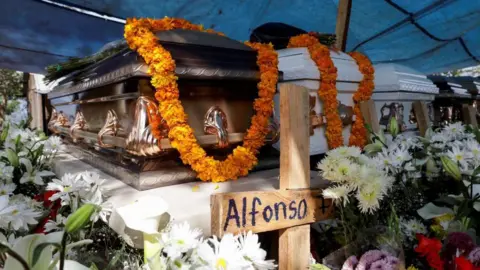Mexican city’s security chief held over mayor’s beheading
Officials in Mexico have arrested a man suspected of involvement in the brutal murder of the mayor of the city of Chilpancingo last month.
The killing of Alejandro Arcos, whose beheaded body was found just days after he had been sworn in as mayor, caused shock and revulsion in the violence-wracked state of Guerrero.
On Tuesday, police detained Germán Reyes, who is the top security official in Chilpancingo, for his alleged role in the murder.
Germán Reyes has denied any involvement in the crime and has said he is being used as a scapegoat.
Rights groups have long warned that local security forces in Mexico are being infiltrated by powerful criminal gangs, which bribe, blackmail and threaten local officials to make them compliant.
The brutal murder of Mayor Arcos within a week of him taking office on 1 October, and Tuesday’s arrest of Reyes is seen by many in Chilpancingo as further evidence of attempts by local criminal groups to tighten their grip on the city and its authorities.
The fact that Reyes – a retired army captain who headed the office of the Guerrero state prosecutor for serious crimes before taking over as Chilpancingo’s acting security chief – has been named as the main suspect in the mayor’s murder has sent further shock waves through the city.
Much of the violence in Chilpancingo is blamed on a bloody turf battle between a criminal gang called Los Ardillos and rival local crime group Los Tlacos.
 Reuters
ReutersLos Ardillos specialise in drug trafficking in the state of Guerrero but have reportedly been expanding into extortion and other lucrative criminal enterprises.
Its members have also been trying to gain control of the city’s security forces.
According to Mexico’s security minister Omar García Harfuch, Mayor Arcos had travelled to an area controlled by Los Ardillos unaccompanied and without a security detail “for a meeting” when he was killed.
Prosecutors have so far provided little detail as to why they suspect Germán Reyes of involvement in the murder.
Reyes told a judge he “had no motive” to harm the mayor, saying that it was Mayor Arcos who had named him as the city’s security chief.
Meanwhile, the federal government has deployed more than 12,000 soldiers and members of the National Guard to the state.
Confronting the wave of violence in Guerrero and other hotspots of cartel and gang violence is one of the main challenges facing President Claudia Sheinbaum, who took office on 1 October.
During her campaign for the presidency, Sheinbaum had dismissed the “militaristic” approach of former Mexican president Felipe Calderón – who declared war on the cartels in 2006 – as ineffective.
She vowed instead to continue the approach of her immediate predecessor, Andrés Manuel López Obrador, who avoided direct confrontation with the cartels, arguing it only led to more bloodshed.
Since being sworn in as president, she has said her government would work on solving crimes and combatting widespread impunity by creating a national intelligence system.



